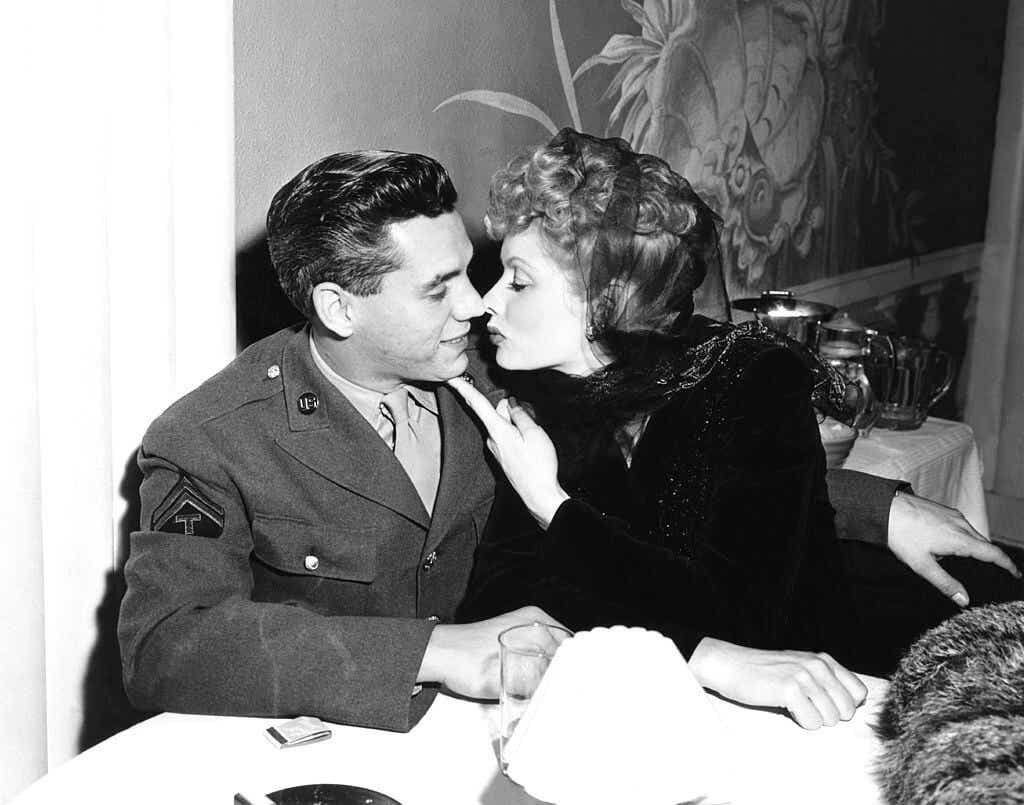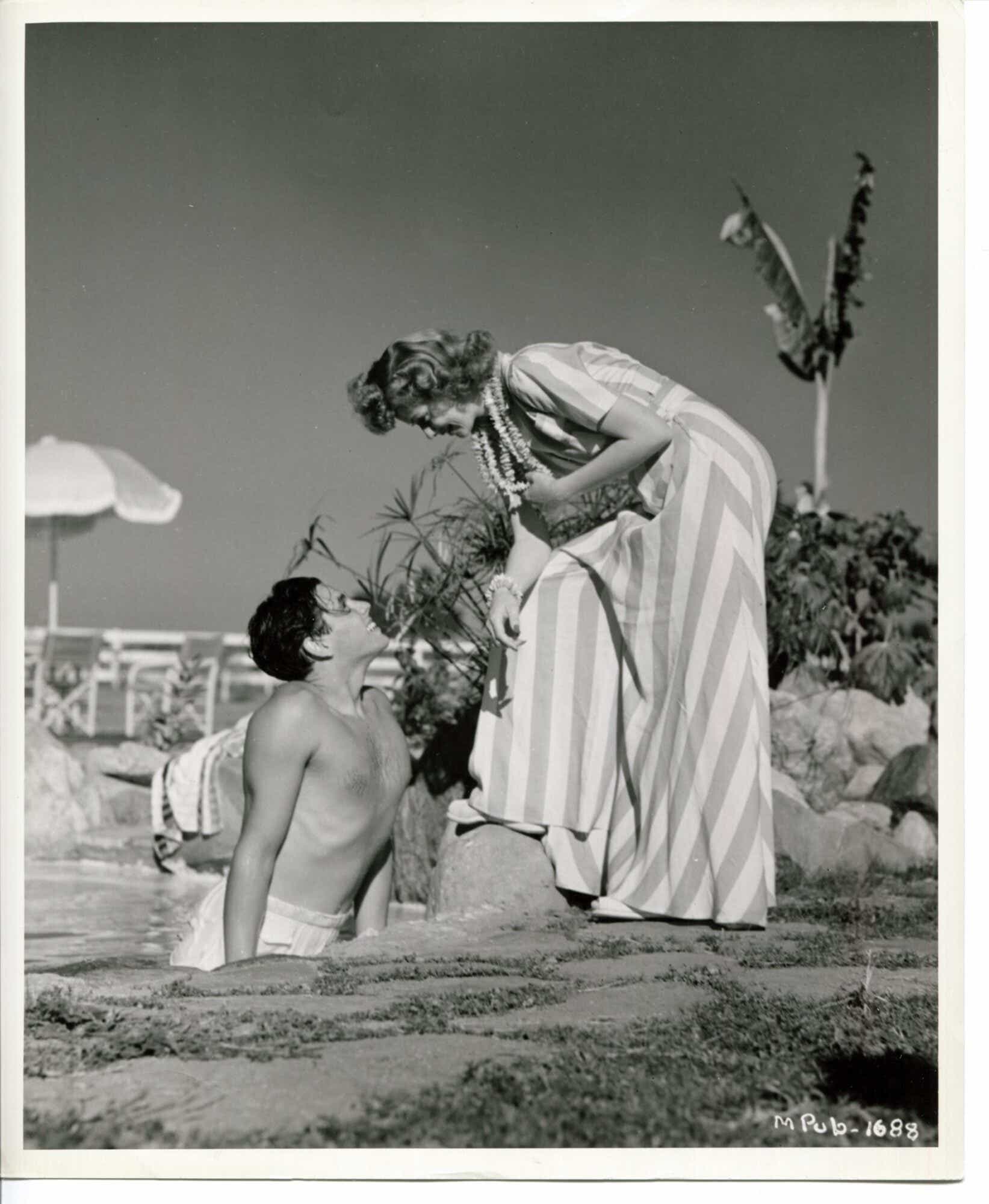A.K.A. Lucy: The Dynamic and Determined Life of Lucille Ball has all the must-read details on the couple’s journey to super-stardom.
The incredible Lucille Ball was loved by so many. But, while famously wed to her I Love Lucy co-star, Desi Arnaz, Ball had to juggle a grand romance with high-stakes business decisions — not to mention that she and Arnaz both had fiery personalities.
This excerpt from Sarah Royal’s A.K.A. Lucy: The Dynamic and Determined Life of Lucille Ball delves into Ball’s decision to marry Arnaz, even though they were…sort of broken up. (Which sounds like a recipe for disaster, if you ask us.)
In November 1940, Lucy was in New York City giving an interview in her room at the Hotel Pierre for an article tentatively titled “Why Lucille Ball Prefers to Remain a Bachelor Girl.” The reporter was keen to ask about her fervid romance, and she was enumerating all the various reasons why, for her and Desi, marriage was out of the question. They had already agreed to call it quits, and maybe saying it out loud made it more official, as if it might help her cope with the pain of impossibility.
Anyone who has seen Lucille Ball — on stage, the silver screen, or in the movies — has fallen in love with her. But despite the near-universal admiration she earned in her professional life, her personal Desi met her at her hotel partway through the interview and sat in the room, anxiously waiting for the wrap-up. “This girl is going to have a hell of a time with that story,” he said, once the reporter departed. “Because I have everything arranged to marry you tomorrow morning.”
Of course I want to marry you, you idiot.
Lucy thought he was kidding. Hadn’t they both agreed that it could never work? Desi said yes, they had, but he didn’t care. Lucy asked if they could simply live together—a very practical solution, she thought, and one decidedly forward-thinking. Desi said no, he didn’t just want to live together—his childhood household had been prematurely torn apart, just as Lucy’s had, and he’d give anything to build something again. He wanted to marry her and have children with her and have a home.
That clinched it for Lucy. Desi’s words matched exactly what she herself had always desired. She wanted Desi, and Desi alone, to share it with.
“Now, do you want to marry me, or not?” he asked.
“Of course I want to marry you, you idiot.”

Sporting a brass ring from the Woolworth’s five-and-dime store on her ring finger, Lucille Ball married Desi Arnaz in a justice of the peace ceremony in Connecticut on the morning of November 30, 1940.
Drunk with amorousness, the couple ate their wedding breakfast and cuddled in front of a cozy fireplace following the event. Desi had up until now ignored his encroaching obligation to his run at the Roxy Theatre — he was due to appear at noon in Midtown Manhattan to lead his band, so he needed to make a phone call. At first irate at the absence, the theater manager later softened and arranged for small packets of rice to be distributed to the audience to throw at the end of the second show and planned a backstage reception for the couple that evening. Desi brought his new bride onstage to thunderous applause. The theater whited out with rice like a snowstorm.
Lucy’s insecurity about whether Desi would make a good husband was still there, the intrusive thoughts swirling in her brain. Independent woman as she was, she decided she wanted nothing more than to please Desi and take care of him, and that she would sacrifice anything to make that happen. After all the distressing back-and-forth about whether they should be together, she was blissfully, deliriously happy.
It was hard to shake those previous tensions, though. At their honeymoon suite back in California, Desi sat in the corner strumming his guitar and mumbling to himself. Lucy, watching this scene, was fearful that Desi was already disinterested, what with the conquering complete. “My God, he’s already tired of me,” she wrote. But Desi was working hard on crafting an original song for his new bride.
When I looked into your eyes / And then you softly said, “I do” / I suddenly realized I had a new world / A world with you.
It was time to establish a home. Lucy’s friend Jack Oakie invited the couple to have a look around at homes near his estate at Chatsworth, out in the San Fernando Valley. Within an hour, they discovered a bucolic ranch alongside an orange grove. Instead of plunking down the asking price of $14,500, after a brief negotiation, Lucy and Desi’s célébrité earned them the perk of paying just a $1,500 down payment with a ten-year mortgage.

Inspired by the mutual estate of Pickfair, owned by silent film power couple Douglas Fairbanks and Mary Pickford, Lucy and Desi decided their new residence deserved its own portmanteau. After cycling through awkward combinations such as Ballarnaz and Ludesi, they settled on Desilu.
For a brief, dreamy period, Desilu was the site of domestic enchantment and a working farmstead. Lucy kept a vegetable garden and raised chickens, pigs, and a cow, never having the heart to slaughter any of the animals and instead keeping them as countrified pets. Desi fancied himself back in Cuba, helping to develop the property by building a barbecue pit, game room, and pool house. This latter addition would come in handy during the Arnazes’ multiple arguments, acting as the proverbial doghouse that Desi could retreat to during a particularly heated squabble. The enchantment did not preclude the same raging, jealous battles that had defined their relationship from the start.
Lucy was overjoyed to have a permanent home once again. She invited all manner of celebrity friends over for lavish parties, in which they ate Desi’s special Spanish spaghetti sauce and had costume dress-up contests. By all reports, Lucy was content to be more of a wallflower at these events, watching Desi taking center stage and lead Conga lines around the ranch. One of Lucy’s interviewers at this time noted that when Desi came into a room, Lucy left it: “It is not that she leaves in person, she merely leaves in spirit. Miss Lucille Ball looked at Mr. Desi Arnaz as if he were something that had floated down from above on a cloud.”
While Lucy admired her husband’s ethereality, he passionately worshiped the ground she walked on, kissing and hugging her and pulling her close whenever she happened to pass by. But additional tensions rose in their marriage — Desi’s career, for one. Film opportunities were largely stifled due to his thick accent — three months of elocution lessons through RKO resulted in it coming out “as thick and as Cuban as ever” — and he struggled with the fact that he was playing second fiddle to his wife. Perhaps worst of all, he was sometimes referred to as “Mr. Ball.” Being both out-earned and out-starred hurt his definition of masculinity. When naming their ranch Desilu, he quipped, “First time I ever got top billing.”
Excerpted from A.K.A. Lucy: The Dynamic and Determined Life of Lucille Ball by Sarah Royal. Copyright © 2023. Available from Running Press, an imprint of Hachette Book Group, Inc.
Photos courtesy of National Comedy Center Archives








